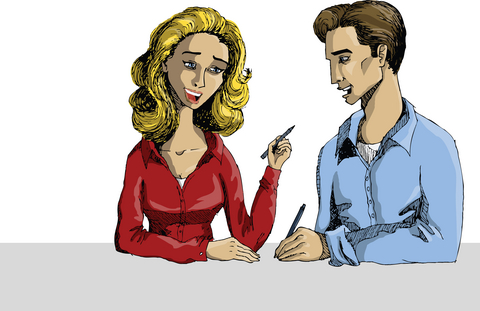Now that doesn’t sound like very wise advice for an up-and-coming novelist.
But wait a minute!
I’m not talking about the actual editor who one day may be reading your manuscript. I’m referring to that editor person who resides inside of your mind, inside of your personality.
Every novelist has a creative side and an editorial side. At times, if you are not totally aware, these two factions may war against one another. The key to great fiction creation is to keep in the two in balance.
Let’s look at both personality types so you can discern which one describes you and your personality.
If your creative side is stronger, you write and write and write; but you simply cannot muster up the courage to sit down and critically go through the work to edit, revise, and rewrite. The old saying in the writing world, “Writing IS rewriting” has not fully dawned on you yet.
This means that your work, which may have a great deal of potential, will be lacking for want of a strong critique or editing. You must tell your editor side of your personality where to go.
Speaking to the editor-side of your personality, you will say: “Editor, wake up! I know you’re in there. Time to step up to the plate and do your thing.”
The next step is to trust that editor to do what you did not think he/she was capable of doing. This is not an incapable editor, rather it is an untrained editor!
Who better than you can recognize, and try to narrow that gap between your vision of the story and what is now on the pages? Who but you can see and sense the lapses, quirks, reader blocks, carelessness, the need to step up or slow down the cadence, or to take out a paragraph altogether?
Stop saying you’ve never been “trained” as an editor. That editor is inside you waiting to be trained, and to be used! Get busy.
The person in whom the editor-side is stronger, can hardly write a page, a paragraph, or even a sentence without that noisy editor exclaiming (rather loudly), “You call that writing? That’s awful! Good grief, whoever told you that you could write a novel? Change that. No, no over here. Change this. Well, it’s all a mess really. Throw it all in the trash. Better yet, there’s the delete button…”
Sound familiar? Now what do you say to this editor? The creative-side of you must rise up and tell the noisy editor where to go. But not rudely, because remember, later on you will be inviting him/her back in!
Say something like this: “I know you have my best interest at heart, and I truly appreciate all your input. But you have come to the party too early. I’m not ready for you. Please go over there and sit in the corner and be quiet until I need you. Meanwhile, as you leave me alone, I’m going to write the very best I can, just as quickly as I can!”
Once you have the editor – whether it’s the weak editor or the strong editor – in place, now you’re ready to do a lot of creating.
Write at White Heat
A good rule of thumb is to write at least six to eight chapters of your novel before you ever stop to edit. The late Jack M. Bickham, author and awesome writing instructor, always said to press on “through the first draft at white heat.” That’s because, as he puts it, “good novels are not written, but rewritten!”
So there you go. You have an editor inside of you. That editor may be a weak editor or a  strong editor. Only you know which. But now that you are fully aware, tell that editor where to go!
strong editor. Only you know which. But now that you are fully aware, tell that editor where to go!
You’ll be a better writer for having done so!
~*~*~*~*~*~*~*~*~*~*~*~
I trust the teaching and instruction given in this blog post was helpful in your goal to be a novelist. For more in-depth writer’s workshops, check out the wide variety offered at the Be A Novelist Website.
~*~*~*~*~*~*~*~*~*~*~*~
Are you one of those budding novelists who makes a great start but you can’t seem to finish? Then this is for you! Be A Novelist, Six-Month, Finish-My-Novel Challenge! Six full months of guidance and instruction. Guaranteed to light a fire under your novel-writing attempts and to launch you into a pattern of consistent writing! Check it out here!
Photo: © Israel Bitton | Dreamstime.com




Good post, Norma Jean. I am a creative editor and that is a mess. But I am now burning through my entire novel, learning how to use Scrivener to make myself notes so I can go back and add things that are changing and things I’m learning. But finally telling that editor to sit and wait has been a dream come true. Eugene
Hey Eugene! Glad I can make your dream come true! :^) Keep on keeping on!
“The old saying in the writing world, “Writing IS rewriting” has not fully dawned on you yet.”
How old a saying would you guess this is? I use it all of the time, but I always, without fail, quote the man who shared it first; E. B. White. “The best writing is rewriting.” I do this so newbies to the writing field know exactly what was said, and who said it. I don’t want some careless writer misquoting me down the road, and if Mr. White said this, then I want to always remind folks that he gets the credit for it. Here is one of my own quotes where I say : “When writers try to fly their works, some of them fall down. But they must always flap their wings – to get off of the ground.” DGFord
Where eagles fly,
Don (Greywolf) Ford
Native American Storyteller
Author of “Royal Ferdinand” and “Death & Taxes” both at Amazon
Hi Don — Greywolf (gotta respect a name like that!!)
Love your feedback. Gets readers thinking (and writers as well). There are so many variations of this quote. Actually Sean O’Faolain said it this way: “The art of writing is rewriting,” O’Faolain was born in 1900, and beloved Mr. White in 1899. Have no idea who said it when, so whoever was first is up for grabs. Point should be well taken even if your dog tells you! In my 30+ years of teaching I find that the necessity of editing, rewriting, and revising to be one of the most difficult things to impress upon the emerging novelist.
Thanks again so much for weighing in on the subject!